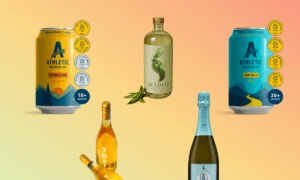Alcohol-Free Beverages May Lead Young People to Start Drinking Alcohol: Cancer Council
A study conducted in the US has shown that zero-alcohol drinks can be utilized in harm reduction.
The Australian Cancer Council has expressed concerns about zero-alcohol drinks based on research into their impact on teenagers.
Contrarily, research indicates that non-alcoholic beverages can be effective for adults looking to decrease or eliminate alcohol consumption.
Over half of teenagers aged 15 to 17 who participated in the research found the packaging of zero alcohol drinks attractive. Additionally, 37 percent of Australian teenagers surveyed had tried zero alcohol products.
The Cancer Council highlighted that some participants in the study suggested that zero alcohol products could potentially lead to future alcohol consumption.
Lead researcher Leon Booth from the George Institute referred to zero alcohol products as a potential “trojan horse” for the alcohol industry to attract young consumers.
“Our research shows that zero alcohol products and marketing are likely making young people more familiar with alcohol brands and further normalising alcohol consumption,” he said.
Mr. Booth emphasized the need for more comprehensive measures to shield children and young individuals from exposure to zero alcohol marketing to prevent future alcohol-related harm.
“Zero alcohol ads are reaching young people through various channels, including popular social media platforms like Instagram and TikTok,” he added.
Four out of five teenagers recalled seeing zero alcohol products for sale, with 58 percent noticing these products in supermarkets.
Furthermore, 76 percent of teenagers had encountered advertising for zero alcohol products, with 44 percent seeing it on television.
Call for More Regulation
The deputy chair of the Cancer Council nutrition, alcohol, and physical activity committee, Julia Stafford, urged the federal government to enhance regulations on alcohol marketing and pay close attention to zero alcohol products.
She cautioned that zero alcoholic products expose young people to alcohol brands in unconventional settings not typically associated with alcohol consumption.
“We already know that the more children and young people are exposed to alcohol marketing, the greater the likelihood that they will start to use alcohol earlier, and to drink at risky levels if they already use alcohol. Drinking alcohol at any level can increase the risk of cancer,” she stated.
“Alcohol brands claim zero alcohol products are aimed at only adults, however, the study found that young people often nominated their own age group as the one these products would most commonly appeal to.”
Ms. Stafford highlighted the absence of standards restricting the ways zero alcohol products resemble alcoholic beverages, as well as the lack of restrictions on their marketing and sales.
This situation exposes young people to marketing in prominent locations such as supermarkets.
Can They Help Established Drinkers Quit?
The study concluded, “Adults who consume alcohol and screen positive for alcohol use disorder report drinking non-alcoholic beverages as a harm reduction strategy.”
“Compared with respondents without Alcohol Use Disorder (AUD), those who screened positive for AUD were significantly more likely to consume NABs in an effort to decrease or abstain from drinking alcohol,” it mentioned.
However, there are concerns about these products being used to increase awareness and acceptance of alcohol brands among young people.
The foundation acknowledges the rising popularity of drinks with minimal or zero alcohol content in Australia.
A study conducted by Liquor and Gaming NSW for the New South Wales (NSW) government found little evidence linking the availability of alcohol-free products to increased alcohol consumption or acting as a gateway to drinking more alcohol.
“Nevertheless, most of the studies were conducted with consumers and markets in the UK, where alcohol is sold in supermarkets unlike Australia. Hence, caution should be exercised when applying these findings to Australian markets,” it explained.
Opting for low-strength alcohol or non-alcoholic alternatives like mocktails is also recommended at gatherings where alcohol is served.
The health department advises consulting a physician when attempting to decrease or quit alcohol consumption.






